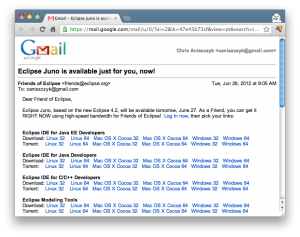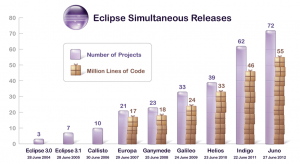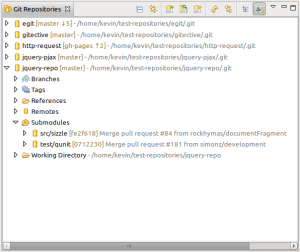As Mike Milinkovich recently mentioned, voting is now open for the Eclipse Foundation’s Board of Directors election until 3:00pm Eastern on March 16, 2012. I highly recommend you take a list of the candidates, read their position statements and cast your vote.
I’m running this year for one of the committer representative spots and plan to continue to do my best to represent committers if given the opportunity again. I’ve had the honor to be on the board for the last few years and have helped push through changes that I thought were important for the committer community. For example, I would like to see our migration to Git through, we are getting close and I would like to see this happen by the end of 2012…
In terms of the future, there are three main things that are important to me:
There are many businesses that adopt Eclipse tools and runtimes, it’s important that we find a way to support these existing adopters while moving the eclipse.org mission forward. There are companies with mature products built on Eclipse with long support cycles that need to be accommodated. For example, Airbus has a crazy ~30 year support cycle on the planes that they build using Eclipse software. One way to do this is supporting the Long Term Support industry working group and ensuring we have the infrastructure (e.g., common build) in place to support these scenarios.
It’s great that the eclipse.org community prides itself on clean Intellectual Property, I’m proud of what we do and it’s crucial for certain types of commercial adopters. However, the downside to the Eclipse IP process is that it can be a barrier to contribution due to the process and record keeping. Given that the software world has changed in recent years with the advent of Git (distributed version control), GitHub and notion of social coding, we should take a serious look at improving our IP process to work in this new world. Can we find a ways to simplify the contribution process using Git or Gerrit? Can we find a way to host an eclipse.org project outside the eclipse.org infrastructure, say on GitHub? I know, heresy, right :)?
Finally, I would like to continue pushing on eclipse.org’s foray into web tooling via projects like Orion. It’s great to see Mozilla Firefox already adopting Orion in its developer tools, but we can do more in this space.
In the end, I encourage everyone to vote and make your voice heard.








